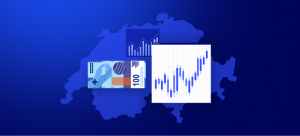The Swiss franc (CHF) has always been viewed as one of the world’s most reliable currencies, which makes it a preferred choice for investors during periods of economic or geopolitical uncertainty. But what exactly makes the Swiss franc so stable? Find the answers on this and other popular questions regarding CHF steadiness in this article.
5 factors behind the stability of the Swiss franc
Over the past 15 years, the Swiss franc has gained its value. Here are the five primary factors behind the ongoing dependability of this currency.
Factor #1. Political neutrality and stability
Switzerland’s longstanding policy of neutrality has allowed it to avoid big international conflicts. In fact, the country hasn’t been involved in any war since 1815. Such a secure political climate has helped make Switzerland (and, consequently, its currency) a safe haven for investors seeking a safe place for their capital. The country’s neutrality extends to its financial system, further boosting the Swiss franc’s stability.
Factor #2. Strong and diversified economy
Switzerland is known for its highly diversified economy, with key industries such as pharmaceuticals, high-quality manufacturing, financial services, and technology. This diversification shields the economy from being too reliant on any single sector, contributing to the stability of the Swiss franc. Its well-developed economy leads to consistent demand for the currency.
Factor #3. Low inflation and conservative monetary policy
Switzerland has managed to maintain low inflation rates over the years. The Swiss National Bank (SNB) prioritizes keeping inflation under control, further bolstering investor confidence. Additionally, the SNB’s policy of stable interest rates contributes to the Swiss franc’s stability. It works to keep inflation lower than many other countries, promoting the currency’s long-term strength.
Factor #4. World-renowned financial sector
Switzerland’s banking system is among the most trusted globally. The country’s financial infrastructure is advanced and highly regulated, ensuring the stability of its financial institutions. Swiss banks maintain high capital levels and liquidity, helping them withstand financial crises. Despite challenges like the Credit Suisse bankruptcy in 2023, the country’s rapid recovery, aided by the government and the SNB, highlights its resilient financial system.
Factor #5. Trust and security in banking
Swiss banks are known for their confidentiality and high levels of trust. While they’ve adapted to international standards of tax transparency, Swiss banking still maintains a level of privacy that is higher than many other countries, which further strengthens confidence in the franc.
Geopolitical risks and the Swiss franc
Lately, geopolitical risks, especially the rise of tariff uncertainty under Donald Trump’s administration, have been a concern. With the US being Switzerland’s largest export market, any increase in tariffs could have a potential impact on Switzerland’s economy. However, despite these risks, the Swiss franc has historically strengthened during periods of global uncertainty.
Even if the Swiss economy faces challenges because of global trade tensions, the franc’s role as a safe-haven currency could cushion its value. In such times of uncertainty, investors flock to assets like the Swiss franc for its stability. Swiss National Bank Chairman Martin Schlegel has reiterated that the Swiss franc will likely remain a safe haven, even amid political instability.
Other safe-haven currencies
Except the Swiss franc, there are other currencies that investors look to in times of crisis:
- US dollar (USD) — the global reserve currency remains the top safe-haven choice, with investors flocking to dollar-denominated assets like US Treasury bonds in times of uncertainty.
- Japanese yen (JPY) — the yen is widely considered a safe haven in Asia, backed by Japan’s high savings rate and stable economy.
- Euro (EUR) — despite challenges in the Eurozone, the euro is the second most crucial reserve currency and remains a trusted safe-haven asset in times of market volatility.
- Singapore dollar (SGD) — with a solid economy and strong financial regulations, the Singapore dollar has gained a reputation as a safe haven, particularly in Asia.
- Norwegian krone (NOK) — Norway’s stable economy, low national debt, and vast natural resource reserves make the Krone a reliable option during uncertain times.
Final note
As global markets become more than unpredictable, the Swiss franc continues to be a great choice for preserving capital. Its political and economic firmness, conservative monetary policy, and trusted financial sector make it a safe haven for investors. While geopolitical risks like tariff uncertainty could put pressure on the Swiss economy, the historical resilience of the Swiss franc suggests that it will remain stable.
However, investors should consider diversifying their portfolios with other safe-haven currencies, including the US dollar, Japanese yen, euro, Singapore dollar, and Norwegian krone, to safeguard their assets amid global economic turbulence.
